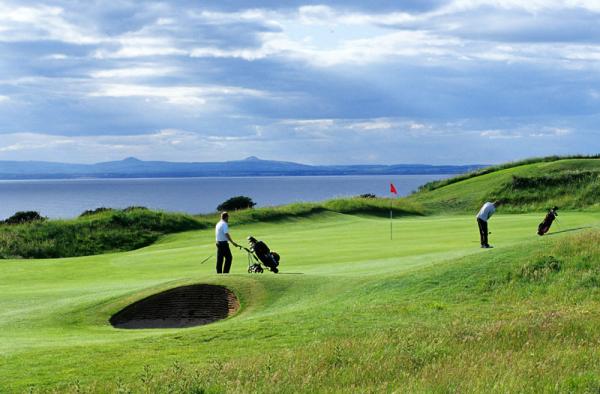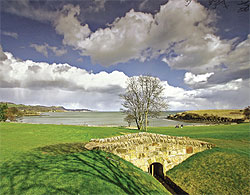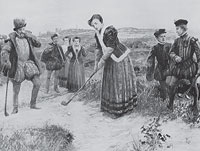King James II famously banned the game of golf in 1457. Fortunately this law was overturned and Britain now boasts some of the finest golf in the world.

Venice has its canals, America the Grand Canyon but, here in Britain, we have the perfect landscapes for that most magical and maddening of sports – golf. Hundreds of courses on moorland, parkland, heathland and< coastal areas; somewhere suitable for any level of skill. A country for Heaven on Earth, or a long walk spoiled, as Mark Twain remarked?
Peter Alliss, ex-professional golfer, Ryder Cup player and now known as the ‘voice of golf’ for his television commentaries, has a lifetime of passion for the game, especially in this country. “Britain is blessed with a variety of golf  courses,” he says. “There are those by the sea, generally called ‘links’. Then there are the many parkland courses where deciduous trees line the fairways, majestic in the early spring and summer but a bit of a curse when winter comes and your ball gets hidden among those millions of leaves. Then there are those downland courses, perched up high with majestics across the countryside, delightful on a hot summer’s day with a gentle zephyr blowing but rather hellish in the winter when the wind bites from the north east.
courses,” he says. “There are those by the sea, generally called ‘links’. Then there are the many parkland courses where deciduous trees line the fairways, majestic in the early spring and summer but a bit of a curse when winter comes and your ball gets hidden among those millions of leaves. Then there are those downland courses, perched up high with majestics across the countryside, delightful on a hot summer’s day with a gentle zephyr blowing but rather hellish in the winter when the wind bites from the north east.
These are my own particular favourites; they’re what I was brought up on.”
History of Golf
When did it all start? Mention golf history to almost anyone interested in the game and mental images immediately turn sepia in colour and take thoughts back to gentlemen wearing tweed jackets, large floppy caps and young caddies carrying armfuls of clubs. The Romans, however, apparently played a game they may have brought to Britain, using a feather-stuffed ball and a curved stick.
 |
| Mary, Queen of Scots, playing golf at St Andrews, 1563 |
“It is generally thought that the game had its beginnings on the rough terrain of a Scottish heath,” Peter Alliss explained to me. “However, my golfing colleagues in Holland insist they were playing a form of golf long before the Scots even thought about it (there are 18th-century Dutch paintings showing a similar game played on ice). And what about those ancient carvings in Egyptian tombs depicting characters, thousands of years ago, appearing to play a game like golf?”
Kings, bishops and princes have all played the game, in fact, the Royal Warrant Holders Association lists “a Sword Cutter and a Goffe-club Maker” for Charles II. One king who took a distinct dislike to golf was James II – he had Parliament ban the game in 1457 as it was a distraction from military training.
Golf as we know it today certainly has its home in Scotland: it is where the rules were first formed, put together in 1744 for the Annual Challenge for the Edinburgh Silver Club. Records show that golf was played at Scotland’s – and the world’s – oldest existing playing golf course, Musselburgh Old Links, as early as 1672. Golf has been played along the links at St Andrews since around 1400 and the Old Course there is renowned throughout the world as the ‘Home of Golf’.
“Perhaps there is some dispute as to its origins,” says Allis. “However we should be ever thankful to whoever got the game going as it’s been a source of pleasure, pain, frustration and elation ever since.”
Turnberry is best known for its first Open, in 1977, when Jack Niklaus and Tom Watson, the two greatest players of the age, went head to head in the legendary Duel in the Sun,as it has become known. It was at the British Open, as it is referred to overseas, in 2000, that Tiger Woods became the youngest player to win the career Grand Slam – at the tender age of 24. We like to boast that Britain is the best venue for golf, not only because it’s the spiritual home but also because it’s hosts perhaps the finest championship, known simply as The Open. Introduced in 1860, The Open was first multi-competitor stroke play tournament.
In July 2009 the Open took place in July at Turnberry, one of the most stunning scenic links courses in Scotland.
The Open is one of the four international ‘Major’ championships, while the European Tour is welcoming back to its schedule the English Open, which will be held in August on the Jack Niklaus-designed course at the St Mellion resort in east Cornwall. St Mellion, near Plymouth, has two championship courses and has hosted the Benson & Hedges International.
In England’s north west, there’s an area which has gained world-wide recognition as having some of the most beautiful courses available. Known as England’s Golf Coast and stretching down from the Lake District to the Wirral, it has the highest concentration of championship links golf courses in the world. There are three Royal links courses – Birkdale, Liverpool and Lytham & St Annes and together these world-famous venues have hosted the Open Championship no fewer than 29 times since 1897.
Wales also adds weights to Britain’s claim to being the finest golfing country in the world. The 1991 Masters Champion, Ian Woosnam, says of his homeland, “Wales isa small country with big golfing ambitions.”
For a small country, Wales manages to cram in quite a lot: 641 castles, 687 miles of coastline – and around 200 golf courses. And, in 2010, the Ryder Cup visits the principality for the first time, at Celtic Manor near Newport. This resort has three championship golf courses including the new Twenty Ten, the first course in history to have been specifically designed to host The Ryder Cup.
So, whether you are a top-flight professional playing for The Open’s Claret Jug, without doubt the most famous trophy in the game of golf, or a 24-handicapper playing with friends, or visiting the country on a golfing holiday, then Britain surely has the best, >the most beautiful, and arguably some of the most challenging, courses in the world.
Throw in a little history, the odd castle or two and some of the most stunning and exciting scenery that Britain has to offer and golf doesn’t seem such afrustrating pastime after all.





 © 2024
© 2024